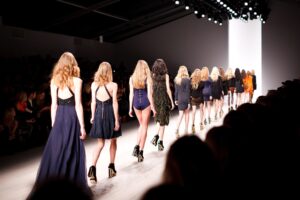Eleanor Antoniou
The Met Gala is the biggest fashion event of the year and enchants fashion lovers with a magical feeling of excitement as they eagerly await the reveal of the theme, the entrance of the guests and most importantly of course, their outfits. Despite the 1st May being months away, the Met Gala 2023 has already caused outrage and controversy online with the recent announcement of its theme. This year, the event and the Metropolitan Museum of Art’s Costume Institute exhibition which it accompanies will celebrate fashion designer Karl Lagerfeld, with the theme Karl Lagerfeld: A Line of Beauty.
This is the third time that the Met Gala has chosen a designer to highlight, in 2011, the museum celebrated Alexander McQueen and in 2017, Rei Kawakubo who founded Commes des Garçons. Karl Lagerfeld is one of the most recognisable names in the fashion industry, having designed for his own brand as well as for Chloé, Fendi and Chanel. Until his death in 2019, Lagerfeld was a regular guest at the Met Gala. His designs have been worn by many famous names as they have climbed the Met’s red-carpet-cloaked steps, including Anna Wintour, co-chair of the event and Editor-in-Chief of Vogue.
Karl Lagerfeld and misogyny
However, it appears that Lagerfeld’s messages were lacking in the beauty that his fashion designs display. While researching for this article, I was left shocked and confused as to how such an influential and well-known designer seemed to promote such blatant misogyny. The Met Gala often inspires controversy due to its exclusivity and its promotion of consumerism, among other things. Yet, the issues raised by Lagerfeld’s behaviour reputedly go deeper, rooted in patriarchal norms which allow white men to get away with almost anything.
An Instagram post by feminist actress and presenter, Jameela Jamil, published shortly after the theme’s reveal criticised the decision to make the entire Met Gala revolve around Lagerfeld. She writes that: “[the designer was] supremely talented, but used his platform in such a distinctly hateful way, mostly towards women… showing no remorse, offering no atonement, no apology, no help to groups he attacked… there was no explanation for his cruel outbursts.”
Was he fatphobic?
“‘No one wants to see curvy women'”
Lagerfeld’s reportedly fatphobic behaviour recalls the uncomfortable cult of thinness that the fashion industry has represented for so many years. It has been noted that Lagerfeld picked on individual women including Adele, whom he dubbed “a little too fat”, and Heidi Klum, whom he called “too heavy”.

Lagerfeld was open about his preference for thin models. In a 2009 interview with Focus he stated, “No one wants to see curvy women” and labelled any women who protested this view “fat mothers”.
He apparently preferred models to be ultra thin like so many designers across fashion’s history of thinness. This reflects the patriarchal infatuation with small, skinny women and the way in which female bodies are repeatedly treated as trends in the fashion industry. Indeed, with the return of Y2K styles this year the trend of thinness also seems to be returning, ironically coinciding with the Met Gala’s decision to celebrate a man for whom this thinness was an alleged obsession.
Karl Lagerfeld on #MeToo
Most appallingly, Karl Lagerfeld openly opposed the #MeToo movement particularly displaying an outspoken misogyny against models. He suggested they were to blame for and even deserving of sexual harassment, simply because of their chosen careers.
“His comments paint them as expendable objects in catwalk exhibitions”
In 2018, he told Número magazine, “What shocks me most in all of this are the starlets who have taken 20 years to remember what happened. Not to mention the fact there are no prosecution witnesses… If you don’t want your pants pulled about, don’t become a model! Join a nunnery, there’ll always be a place for you in the convent.”
These models are women whom Lagerfeld depended upon to showcase his designs, but his comments paint them as expendable objects in catwalk exhibitions. Not people who should be treated with respect, upholding the stereotype that models or women in fashion generally are vapid and unintelligent.
Should we separate the art from the artist?
Ultimately, the question is whether it is right to forget Lagerfeld’s problematic aspects and judge his designs solely on their own beauty. Can we ever fully separate the art from the artist? In this case, it feels as if Lagerfeld’s clothes depict his own apparent views on what the ideal woman should be or women he approved of – those who were ultra skinny, conventionally beautiful and silent against abuse.
“As a feminist, I feel disappointed that this might mean following a line of beauty that is narrow, exclusionary and misogynistic”
The line of beauty that the theme’s title evokes hints at one which is thin, impossibly ideal and isolating. It may disconnect women who are anything other than the thinnest size, divide women based on their body types and pierce straight through any woman who has ever experienced sexual harrassment (which sadly, is almost all of us).
As a fashion enthusiast, I want to remain excited about the Met Gala, but as a feminist, I feel disappointed that this might mean following a line of beauty that is narrow, exclusionary, and misogynistic. Lagerfeld made uncomfortable comments across his career yet never gave any hint of an apology. He continued to walk the red carpets and be featured in glossy magazines, as if he were revelling in the controversies he created.
Ultimately, it seems as though the Metropolitan Museum has ignored and brushed away all of the issues surrounding Karl Lagerfeld. Especially when they could have chosen any theme or any other designer who doesn’t have a reputation as a misogynistic white man. It is time to call out proclaimed misogyny for what it is, rather than celebrate designers who are emblematic of the problem.
Featured image courtesy of Pexels from Pixabay. No changes were made to this image. Image license can be found here.
